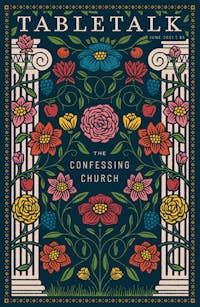
Request your free, three-month trial to Tabletalk magazine. You’ll receive the print issue monthly and gain immediate digital access to decades of archives. This trial is risk-free. No credit card required.
Try Tabletalk NowAlready receive Tabletalk magazine every month?
Verify your email address to gain unlimited access.
As a pastor, I am frequently asked about the best resources available for growth in the Christian faith. We live in a time when there is no shortage of devotional books to help with personal and family piety. Part of the challenge is that Christians are culturally conditioned as consumers to think that the newest and best-selling devotional will be the long-awaited answer for improving their Christian walk. This mind-set is so deeply embedded in the modern churchgoer that people often cast aside as obsolete the best resources they already have.
Tending to the means of grace in public worship every Lord’s Day should be at the top of the list for anyone who wants to improve his personal and family piety. Further, people who are committed to spending more time in Bible reading and prayer will be helped greatly in sanctification. There is one resource, however, that is overlooked when it comes to growth in the Christian faith: the confessions of the church.
Knowing and studying confessions are of great value for our piety as well. But we have been told that people who use confessions trust in them too much. For many, the result has been an avoidance of confessions and catechisms altogether. Further, we have been told that the church’s old confessions and catechisms are lifeless dogmas that work against achieving authentic spiritual life. Nothing is further from the truth. The Reformed confessions greatly aid the kind of vitality in the Christian life that people often seek everywhere else.
With this in mind, we have to appreciate some of the important ways the Reformed confessions and catechisms help us with personal and family piety.
First, the confessions help us know God and ourselves so that we might properly acknowledge the Lord. Our approach to God can be compromised in family and corporate worship if we have a faulty doctrine of God and man. This has serious consequences for Christian piety. The confessions are a great resource for remedying this problem by cultivating a proper knowledge of God. Consider the Belgic Confession, article 1, on what we believe about God:
We all believe in our hearts and confess with our mouths that there is a single and simple spiritual being, whom we call God—eternal, incomprehensible, invisible, unchangeable, infinite, almighty; completely wise, just, and good, and the overflowing source of all good.
From this proper knowledge of God, we then turn to a knowledge of ourselves as the confessions help us understand the fall, the problem of sin, and how we can escape our sad predicament. This knowledge is requisite for properly understanding, revering, and adoring the Lord in our lives.

Second, the confessions help us understand the seamless nature of the Christian gospel and the beauty of its coherence. They tell the whole story of the Bible as fulfilled through the person and work of Jesus Christ, helping us understand the larger purpose of God’s revelation. The Bible announces from Genesis to Revelation, in the person and work of Jesus Christ, peace and reconciliation with God through the forgiveness of sin. The confessions capture these central truths of the gospel for our spiritual edification. Westminster Larger Catechism 70, for instance, speaks of justification as an act of God’s free grace in which He pardons all our sins, accepts us, and accounts us righteous only because of the righteousness of Christ imputed to us and received by faith alone. This truth is intended to have a freeing effect in the life of the believer. Christians who do not have a good understanding of the central goal of God’s revelation to us in the gospel will struggle with assurance and confidence before God. The confessions help us see this larger coherence.
Third, the confessions help us love the Lord in our sanctification. This love is demonstrated when we live thankfully according to God’s law and commune with Him in prayer. In the gratitude section of the Heidelberg Catechism, for instance, there is an extensive treatment of the law meant to help the believer walk in the newness of life. This is followed by a very uplifting section explaining the Lord’s Prayer intended to motivate daily conversation with God. The heart of Christian piety has to do with putting sin to death, striving to be holy, and spending time in prayer. The Reformed confessions were written with these goals in mind, to provide daily help for believers in their Christian walk.
The church’s confessions and catechisms are not lifeless documents; they are biblical truths summarized with the intention to give Christians help in their lives. Dear Christians, open your church’s confessions, for they are a treasury of resources that will help shape your piety and help you grow in love for God.
